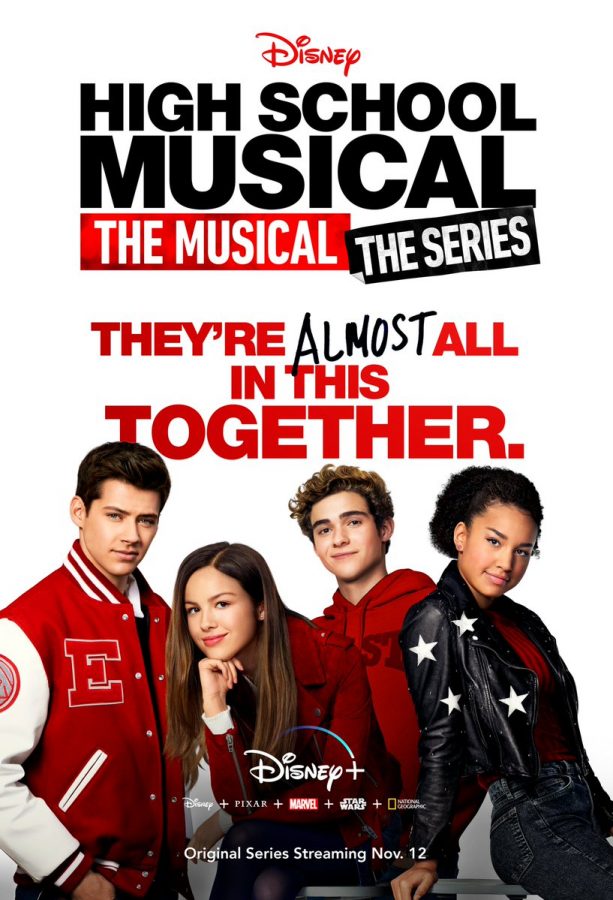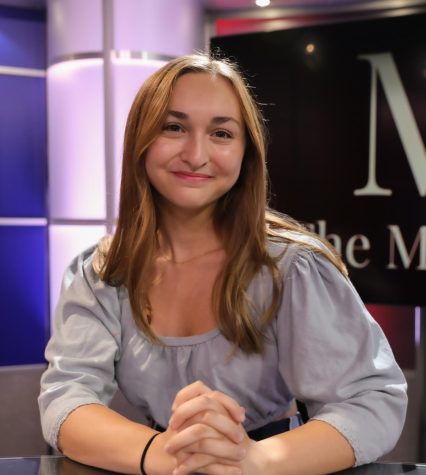Review: “High School Musical: The Musical: The Series” sticks to the status quo
December 2, 2019
As a new addition to the slew of streaming services, Disney+ plays on members’ nostalgia from their time being Disney kids.
The Gen-Z cult classic, “High School Musical,” is one of these beloved, heavily romanticized films. The movie debuted on Disney Channel Jan. 20, 2006 with Zac Efron and Vanessa Hudgens as the center-stage heartthrobs in a teen tale of the students at East High School and their balance between extracurricular activities like musical theater and basketball and their star-crossed relationships. The musical aspect of the movie defeated early 21st century social constructs like staying in set cliques and suppressing male’s emotions while having catchy and upbeat songs.
Almost a decade later, this movie carries the same weight it did when it first debuted, and, as narcissistic as it may seem, Disney created an entire show, “High School Musical: The Musical: The Series,” to flaunt its long-lived legacy.
In this Disney+ series, a new cast of characters attend the high school where the original “High School Musical” was filmed, East High, and perform a musical version of the film.
The “Glee” meets “The Office” mockumentary-style show begins with the students of East High returning for a new school year. But instead of Gabriella awkwardly transitioning into a new school, her inspired character, Nini, played by Olivia Rodrigo, struggles to confront her ex-boyfriend Ricky, played by Joshua Bassett. Ricky, best described as the love child of Troy Bolton and Jim Halpert, tries to maneuver his way back into Nini’s life after breaking her heart in the beginning of the summer for not reciprocating her “I love you.” Though, little did he know, their “break” was an actual break-up sealed by Nini’s summer “showmance” with senior hunk, EJ, played by Matt Cornett.
Desperate to win back her heart, Ricky auditions as Troy for the musical, despite the fact he hates musicals, knowing Nini would audition for Gabriella. Fittingly and obviously, they are cast as the musicals leads and the objective for the entire season, as underwhelmingly laid out by the first episode, is the reconvening of these two love-lost teenagers through musical theatre.
Growing up during the reign of shows like “Hannah Montana” and “Wizards of Waverly Place” makes me a scathing critic to the cute yet overly-cliche writing by Tim Federle in the series. When I watch these shows as an 18-year-old girl, I enjoy them as much or even more than I did when I was six. That’s the power of good story-telling — speaking to and entertaining audiences beyond its prime.
“HSM: The Series” is at a good starting point to reach the caliber of Disney Channel Golden Age shows, but its banality and over-reliance on stereotypes is holding it back.
With such a diverse cast of characters, it is evident that Disney is trying to push the envelope on social change. But, they are doing so with trite, falsified stereotypes.
The writing for Kourtney, Nini’s best friend, played by Dara Renee, is a shot in the foot for Disney’s social goal. Her mainstream feminist persona, while strong-willed and non-conformist, parodies the feminist movement by making them seem man-hating, like her personality.
Her character development, clearly inspired by unfair, prominent stereotypes is one of the many unoriginal plots points the show relies on.
Federle really “sticks to the status quo” with his use of cheesy, annoyingly overused high school dialogue and predictable events.
This defeats part of the show’s purpose of demonstrating how the original movie’s characters are relatable to modern archetypes, who are diverse in terms of race, sexual orientation and upbringing.
For example, Seb, played by Joe Serafini, is cast as Sharpay, on the basis of having a similar personality to her. So why can’t Gabriella’s real-life reflection, Nini, be single?
In my opinion, that would push the change envelope even further by defeating social concepts that girls like Gabriella — brainy, yet shy — need a boyfriend to keep them grounded. Also, the eventual rekindling with the Troy-like character would seem more significant and poignant.
“HSM: The Series” did not completely fall short though. The show’s talented musical numbers and encapsulating performance by its leading actors is the center of the shows success.
During the audition scene of the first episode, I was stunned by the number of East High students that could do a high kick and belt their way to Broadway. The musical numbers avoid awkward flash-mob outbreaks that are common in musicals and the songs are original and beautifully sung.
But, Disney’s musicality was never the issue, it was always the acting.
I was nonetheless stunned with Bassett and Rodrigo’s performances since they are both products of modern Disney Channel, an embarrassingly bad overacting platform. Both of these actors truly possess the persona of Troy and Gabriella and hold up scenes that would otherwise crumble due to dry writing and poor performances by supporting actors. Their high-energy and believable performances gives me hope for the shows future and the legacy of Troy and Gabriella.
To conclude, “HSM: The Series” did not completely fall short, it just fell in the trap that many tween-targeted shows do — relying on cliches. Federle’s writing is stale, mainstream and sometimes even offensive. However, dedicated performances from Bassett and Rodrigo along with East High students musicality and the viewers nostalgia has kept the show afloat.









Judy • Dec 22, 2019 at 3:31 am
Thank you for touching on the stereotypes propagated in the series! I am so tired of the cliche sassy black friend trope! Honestly, it seems like black girls/women get the short end of the stick in film portrayals. They are friends with the main female lead with no aspiration beyond fashion/make-up or only good at showing abrasive attitude. Not all black women are like this! I wish writers would be original and stop with the 1-dimensional narrative. As though African American ladies are only good at bolstering the main character’s self-esteem, dropping a plucky one-liner or two and then disappearing into the abyss with no broad goals of their own.
Kourtney especially looks like a clown in the series, overdone make-up and attitude and mostly there for comedic relief. I want a realistic portrayal, please! Drop the fighting the patriarchy nonsense, over-the-top hair and costume and unrealistic depictions. I get that this image is what makes people comfortable, but it is widely inaccurate as black women have many interests and varied personalities. Failing to accurately portray the rich milieu of black females is almost as damaging as if there was no representation at all. These kind of characters are setting people back because it purports that there is a one-size-fits all mold, which is entirely untrue. Thank you again for writing the article!